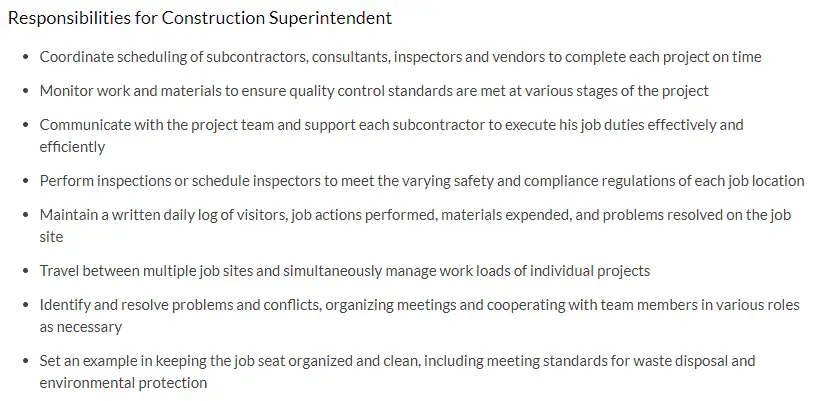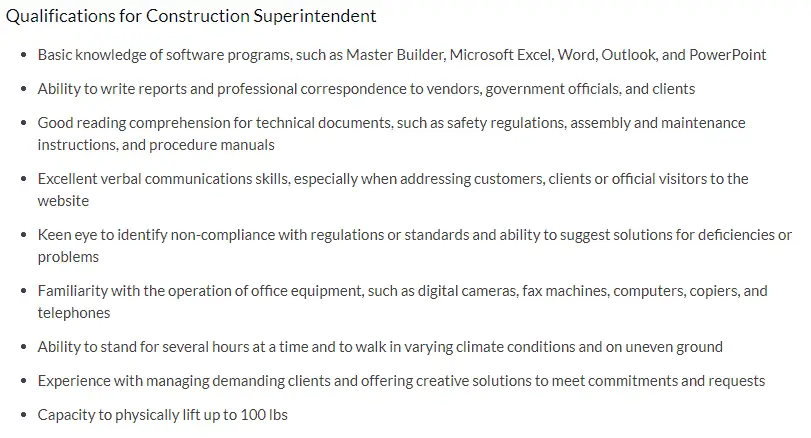
Image credits: McLain Companies
In our “Construction Superintendent Interview Questions” blog, we observed the interviewing process from a superintendent’s perspective and shared some key answering strategies. It is time to visit the other side of the table and understand how to hire a construction superintendent for your company. If you are a part of the hiring team – you could be a manager or a director – you have the major responsibility of finding the right construction superintendent for your specific project types. Interviewing potential candidates and narrowing down the superintendent pool can take some time, especially if you are on a hunt for high-achieving professionals. In this article, we will share different ways to zoom in on relevant caliber, expertise, and jobsite-ready skills for hiring the best construction superintendents.
How to hire a construction superintendent
Identify your company’s requirements
Construction superintendents have a frontline jobsite role for all projects. They are required to monitor field activities and progress, which makes them the first point of contact for all jobsite information.
This includes meeting stakeholders, supervising jobsite employees, keeping the managers well-informed, tracking schedules, setting budgets, allocating materials and other resources, checking the project flow, organizing jobsite training, implementing safety rules, scheduling inspections, and a lot more! Construction companies have different expectations for this role, as their projects can vary based on residential, commercial, and industrial scopes.
In order to hire the right candidate, you should first identify your construction gaps in terms of aspects like:
- A shortage of construction superintendents in your company.
- A lack of relevant expertise for overseeing specialty projects (such as historic building restorations, space center constructions, disaster recovery, and so on).
- The need to travel abroad to oversee international projects and expand your vendor network.
- The need to conduct remote site supervision.
- A high demand for part-time or freelance construction superintendents during project bottlenecks caused by delays, logistical failures, poor jobsite management, etc.
By making a list of such elements, it will be easy to decide what types of portfolios you need to bring on board. Skillset compatibility is a huge part of the hiring process, so identifying the required skills beforehand will save a lot of time later on.
Build a clear job posting and use keywords
Once you have identified which gaps need to be addressed, you can work on the job posting more confidently. It is important to clarify your expectations as a hiring construction firm so that interested candidates will know exactly what is expected of them. A well-structured job posting includes the following elements:
- Your company’s introduction.
- A clearly defined job description for daily responsibilities.
- A list of qualifications and desirable skills.
- The salary range.
Setting an easily understandable job posting will allow applicants to match your requirements with their own portfolio, which in turn simplifies your screening process. If you are using recruitment tools like Glassdoor or similar websites, you should focus on relevant keywords that will target the right audiences for your job opening. For example, keywords like “commercial construction superintendent”, “site superintendent”, and “assistant superintendent” help with creating an optimized and more visible job posting that is sure to reach its intended audience.
Here is an example of a good construction superintendent job posting on Glassdoor. It leaves little to no room for guesswork and is pretty straightforward in terms of what responsibilities and qualifications are required by the company.

Image credits: Glassdoor

Image credits: Glassdoor
Keep an eye out for potential in-house employees
Our next advice on how to hire a construction superintendent is to evaluate your existing jobsite employees to see who fits the role of a superintendent perfectly – both in terms of educational and experience standards. Quite often, a construction firm will choose to promote deserving employees up the ranks as part of its career advancement strategies, so this really helps in fast-tracking the recruitment stage. Architects, engineers, different tradespeople, and assistant supervisors are all potential candidates for the job. Employees who have maximum jobsite visibility and are excellent leaders already check some major boxes, so if they are interested in branching out their career path, go ahead and hire them!
Set realistic qualification criteria
Construction superintendents should have an associate degree or a bachelor’s degree in majors like construction management, civil engineering, construction sciences, and architecture. While acquiring a master’s degree is desirable, it is not a mandatory requirement for the role of a construction superintendent. Candidates can have just an associate degree and still qualify for the job because of their portfolio diversity and heaps of onsite experiences (spanning 5 or more years). On the other hand, someone with a master’s degree in construction might not be the most field-ready employee due to limited working opportunities.
So, instead of setting the academic bar too high and missing a truly capable future superintendent, make sure to be realistic about your qualification standards. This also depends on your company’s guidelines and talent availability, so you might find yourself walking a few fine lines during the recruitment process.
You can also prioritize ongoing certifications as part of academic qualifications – in addition to a degree. Construction superintendents benefit from ongoing training as it gives them a chance to update their skills and keep up with the industry’s pulse. So, candidates who have various certifications to back their resumes should be on the top of your hiring list. Some people might aim for recognized credentials while others may prefer bridging some personal gaps (by learning a new language, for example). In either case, getting certified or receiving training indicates a willingness to learn and improve, and the more these efforts benefit the job, the better. You can look for the following certifications and training options while hiring the right superintendent:
- Software training for construction management software like Buildertrend, Procore, Fieldwire, etc.
- NCCER Construction Superintendent Certification – designed to recognize and certify candidates for having just what it takes to oversee the complete project lifecycle.
- Occupational Health and Safety Administration (OSHA) Certification – designed to address safety aspects and arm a construction superintendent with updated jobsite safety tools.
- Certified Construction Manager (CCM) credential – ideal for all construction management-based skills and expertise.
Look for skills that easily stand out
Another key recruitment strategy is to notice competitive skills that make an applicant the clear winner. While every applying candidate might meet common prerequisites like site management experience and safety caliber, not everyone possesses jobsite-ready skills that make a good construction superintendent – particularly if it is their first time at the role. So, if you come across the following skills, consider using them as your shortlist metrics:
- Leadership skills. Candidates with more experience in leading jobsite teams will know how to set the dynamics and keep the project stages well-aligned.
- Multitasking skills. Construction jobsites are unpredictable and demanding, so a good superintendent should be able to multitask without crumbling under pressure.
- Communication skills. Jobsite communication is perhaps the most important part of being a superintendent, which is why it is best to work with people who are excellent communicators. Since construction superintendents have such a people-bound job, it is always a plus to hire multilingual candidates, as they can also help your company build international networks.
- Problem-solving skills. Jobsites are prone to errors and challenges, so a candidate who knows how to deal with logistical issues, labor shortages, and similar problems will get the project back on track instead of wasting time blaming someone else.
- Management skills. These go hand in hand with good organization skills, which in turn come from the ability to work with construction management apps.
Assess their field awareness
Jobsites are the “natural habitats” for construction superintendents, as these professionals do not have much to do in an office setting. The hiring process should ideally include a visit to the jobsite so that you can determine their field awareness and familiarity with various trades, equipment, safety protocols, etc. It will also give you a chance to decide if a candidate is suitable for your company’s project types based on the skills they demonstrate – such as software proficiency, red flag detection, and field analysis.
Ask the right questions
Coming to the actual interview itself, here are some key questions to ask while hiring a construction superintendent:
1. How will you implement jobsite safety among employees?
You should look for the candidate’s safety understanding and implementation techniques for this question, backed up with relevant work experience from their portfolios. This is the perfect chance for candidates to demonstrate their site safety skills, equipment handling knowledge, COVID guidelines, site inspection duties, etc. So, the answer to such a question will tell you a lot about the candidate’s commitment to jobsite and worker safety and their seriousness towards code violations.
A good answer should include the importance of personal protective equipment (PPE), pre-ordering all the required safety gear, enforcing the company’s rules, checking for compliance via supervision, and so on. You should also expect a potential superintendent to talk about providing safety training to the jobsite teams, checking if they know how to use tools and equipment safely, and making sure that each stage is code compliant.
2. What were some of the main challenges you encountered as a construction expert during the pandemic?
This is one of the most important and current questions to ask before hiring a construction superintendent. The pandemic brought a whole new wave of construction obstacles for experts in this industry, so by asking this question, you are actually giving the candidates a chance to prove their adaptability. The candidates’ answers will explain a lot about their approach to handling unforeseen challenges during these times. They should ideally talk about the worst challenges they faced while onsite and the various opportunities that helped them turn the odds in their favor. For example, a good candidate would identify labor shortage as the major problem and go on to explain the steps they took to find alternatives – such as hiring a temporary workforce, outsourcing key trades, and so on.
3. Do you think you are the right candidate for managing our material procurement areas?
This can also be geared towards pandemic-based questions, so there are different ways to evaluate the applicant’s strengths and weaknesses. Construction superintendents are responsible for gathering the right resources for the project – and making sure that they arrive at the jobsite on time. So, if your company already has a procurement problem, you want to hire someone who is (a) great at finding things and (b) an excellent communicator. Good answers may include evidence of strong procurement skills, familiarity with updated costs, and an affinity for network building.
4. How would you list the project milestones for residential construction?
You can phrase this question in different ways to suit the type of project for which you need to hire a construction superintendent. The answers to such a question will help you understand how familiar the candidates are with this specific project type. You can ask for verifiable and relevant experience as well to learn more about their skills in supervising excavations, foundations, utilities, framing, flooring, permits, punch lists, etc.
A potential superintendent should be able to list the project milestones chronologically, always remembering to factor in client approval, milestone inspections, and code compliance for each stage.
Conclusion
While it is great to align a career path from a superintendent to a manager to a director – and so on – most new hires tend to forget that such a career journey takes time. They simply look at the level of a superintendent as a fast-track ticket higher up the tiers, which is why they lack the extra-mile effort required by this job. For example, such supers will refuse to take feedback and not care to plan ahead for the project, causing the tradespeople to figure things out on their own.
Having a passion for the job is just as important as building a portfolio-rich resume, so do not limit your hiring criteria to only black and white details. Construction experts who walk in for an interview with a well-planned career path ahead of them will easily stand out for their passion and commitment. You want to hire construction superintendents who fully understand and appreciate the stated timeline for being a super before becoming eligible for a promotion – therefore, passion vs greed should have an easy winner! So, make sure that you find people who are as excited to be construction superintendents now as they are to become directors in the future.
